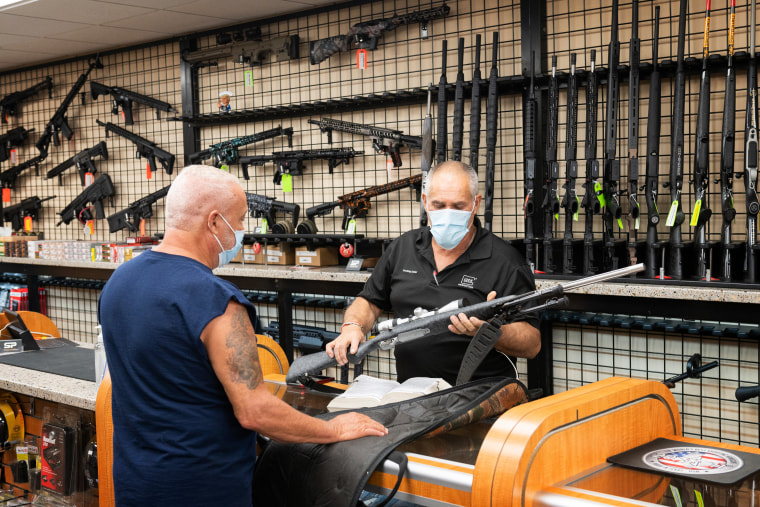WASHINGTON — After years of failed attempts to pass a firearms background check bill, two senators think they have a path to agreement — at least on one key component of a deal.
Sens. Chris Murphy, D-Conn., and John Cornyn, R-Texas, have been quietly negotiating a way to bolster background check rules by making a small but consequential tweak to current law, which they say would close an unintended loophole in the system that has led to preventable mass shootings.
House-passed legislation to require background checks on nearly all gun purchases has stalled in the Senate. But Murphy and Cornyn, who have been negotiating behind closed doors with little fanfare, believe they may have a formula that can attract broad support from both parties.
Specifically, they want to clarify who is required to register as a federal firearms licensee, or FFL, and thus conduct FBI checks on a buyer before selling a gun. The senators say an ambiguity in the law has enabled unlicensed sellers to transfer weapons to dangerous people who skirt the background check system.
Cornyn said in an interview that Congress always intended to require anybody “in the business of selling firearms” to register as a licensee, but that the lack of a clear definition in the statute is allowing some buyers and sellers to evade that rule.

“We need to clear that up,” the Texas Republican said. “That by definition will make more people get background checks because all federal firearms licensees have to do background checks.”
“What we're trying to protect, or carve out, are the hobbyist and or casual transactions between friends and family members, but capture the people who literally are making a living and making a profit selling firearms, and give that to the U.S. attorneys to prosecute,” he said.
Still the two parties disagree on other gun-related issues. While there's room for a deal on licensing rules, a Cornyn aide said they were not close to an overall legislative deal that can pass the Senate.
In many states, unlicensed individuals sell firearms without a background check in what is known as the “private-seller loophole.” These sales can occur at gun shows or over the internet, which lawmakers have tried to prevent by beefing up regulations for those types of sales. But those efforts have faltered.
It is a loophole that police believe enabled a shooter to obtain the gun he used in 2019 to kill eight and injure 25 in a West Texas shooting rampage.
The Murphy-Cornyn policy could achieve some of the same goals in a way that is more palatable to Republicans and gun rights activists.
“It’s an opportunity for agreement,” Murphy said.
“There is interest about reclassifying — about clarifying who is a dealer, who isn't. It's very difficult to enforce, because the statute is ridiculously vague right now,” Murphy said, echoing Cornyn's remarks. “We're talking about a number of ideas. That’s one of them.”
Murphy, an outspoken proponent of tougher firearms laws, and Cornyn, a supporter of Second Amendment rights, know their way around gun politics. The two crafted the modest "Fix NICS" legislation to improve reporting into the National Instant Criminal Background Check System that passed Congress with broad support in 2017 and was signed into law.
“I would like to have this on the floor this summer,” Murphy said.
Senate Majority Leader Chuck Schumer “has been very clear: We're going to have a vote on this,” Murphy added. “So, whether there's a compromise done ahead of time or not, we're going to vote on expanded background checks.”
John Feinblatt, the president of Everytown for Gun Safety, said closing loopholes is one way to strengthen the background check system, “and it’s encouraging that bipartisan conversations led by Sen. Murphy are moving in a positive direction.”
“Still, the devil is in the details and any agreement needs to reflect the fact that Americans across party lines want to strengthen background checks to keep more guns away from people who shouldn’t have them, like criminals and domestic abusers,” he said.
Cornyn said he’s motivated to close the loophole after it was exploited by the shooter in Odessa, Texas, who couldn’t buy a firearm from a licensed dealer due to mental health problems.
“But then he went to an unlicensed dealer who bought parts and assembled those — but basically was in the business of manufacturing firearms,” he said. “But because he was not a federal firearms licensee — because he was evading that requirement — he didn’t do a background check and this guy got this AR-15 lookalike and killed a lot of innocent people.”
The negotiations have been slow.
“Coming up with the exact language is a little bit of a challenge because you're always going to find somebody who's trying to parse those words,” Cornyn said. “But I think we can.”

